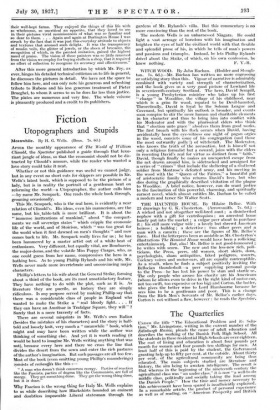WITCH WOOD. By John Buchan. (Hodder and Stough- ton. 7s.
(id.)—Mr. Buchan has written no more engrossing or satisfying story than this. Vigour of narrative is admirably combined with variety and strength of characterization, and the book gives us a very good picture of Lowland life in seventeenth-century Scotland. The hero, David Sempill, is a young Presbyterian minister who takes up his first " charge " in Woodilee, the village of his childhood, near which is a grim fir wood, reputed to be Devil-haunted. Theoretically, David is loyal to the Solemn League and Covenant, but spiritually his outlook is broader, and events soon conspire to stir the more human and charitable elements in his character and thus to bring him into conflict with his Moderator and with the pharisaical elders who think that " election unto grace " absolves them from good works. The first breach with his flock occurs when David, having accidentally been the eye-witness one night of pagan orgies in the wood, convicts some of his congregation (and those the most outwardly godly !) of witchcraft. The Moderator, who knows the truth of the accusation, but is himself not only a religious formalist but a coward, joins with the elders in resenting David's zeal for virtue as distinct from faith." David, though finally lie makes an unexpected escape from the net drawn around him, is sidetracked and arraigned for a series of " crimes " that include the sheltering of a shattered soldier from Montrose's defeated army, and his meeting in the wood with the " Queen of the Fairies," a beautiful girl of aristocratic family who returns David's love, but who dies during the graphically described visitation of the plague to Woodilee. A brief notice, however, can do scant justice to the fascination of this powerful, charming, and spiritually earnest novel, which almost entitles Mr. Buchan to be called a modern and terser Sir Walter Scott.


































 Previous page
Previous page